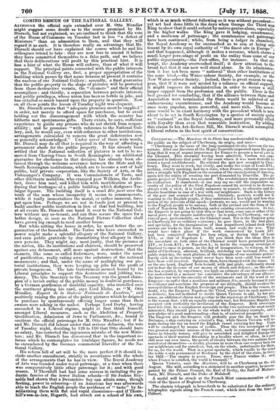CHERBOURG.—The Moniteur de la Flotte has condescended to enlighten the
public on the subject of Cherbourg, its origin, and uses- " Cherbourg is the issue of the long-continued rivalry between the two nations. After our disasters of the Hogue Tourville impressed upon the great King that it was of urgent importance for France to possess a naval part in the Channel. This necessity having been admitted, Vauban was com- missioned to indicate that point of the coast where it was most desirable to found a naval establishment. He selected the spot now occupied by Cher- bourg. They went to work, but slowly, and under the reign of LOMB XVI., nothing, strictly speaking, had been done., when France, entering once more into a struggle with England on the occasion of the emancipation of America, again felt the utility of creating the port demanded by Tourville. The gi- gantic project of Vauban was resumed. The revolutionary storm prevented its realization. It slumbered—if one may say so—till the imperative ne- cessity of the policy of the First Napoleon caused its revival to be decreed, always with a view, it is hardly necessary to remark, to offensive and de- fensive hostilities in case of a war with our neighbours. Such is the history of the port and arsenal of Cherbourg. Certainly, pretexts would not be wanting to the English people, if they entertained a less high and less clear notion of the interests of the epoch—pretexts, we say, would not be wanting to the English people to be uneasy, both at the ground and the form of the visit of Napoleon III. to Cherbourg under existing circumstances. In fact, the Emperor is not going to visit this or that town, some one or other of the naval ports of the empire indifferently ; he is going to Cherbourg, our ad- vanced post, preeminently, on the Channel coast. Nor is the Emperor going to Cherbourg for an ordinary ceremony; he goes there, in the first place, and specially, for the inauguration of that magnificent inland dock which crowns our works in that town, built, armed, and ready for war. What would have taken place if the work commenced by Louis XIT. had been completed during his long reign, or during that of Louis XVL, or that of Napoleon I. Do you think that the ideas then in the ascendant on both sides of the Channel would have permitted Louis XIV., or Louis XVI., or Napoleon I., to invite the reigning sovereign of England to come in person, on the day of inauguration, to witness, in the midst of Cherbourg, adorned, brilliant, reechoing our national files, our public rejoicing, the most glorious of the triumphs of our maritime genius ? Surely such an invitation would never have been sent—still less would it have been well received. Opinions, then, have changed with the times. If, on the one hand, England feels herself, with just pride, sufficiently strong not to fear the increase of our means of attack and defence ; on the other, she has acquired, by experience, too high an estimate of our character—she has understood in a manner too conclusive the advantages of our alliance, she knows too well the sincerity of the sentiments and of the word of our Emperor—to suffer that a maritime and military fete, merely because it puts in evidence and sanctions the progress of our strength, should awaken the susceptibilities of the English Sovereign andpeople. This is the reason, no doubt, why the Emperor Napoleon the Third, whose tact in such matters is SO delicate, has not hesitated to invite Queen Victoria to add, by her pre- sence, an additional charm and peeetige to the rejoicings at Cherbourg; this is the reason that, with an equally exquisite tact, her Britannic Majesty.has accepted with cordiality the invitation of the Emperor. Both sovereigns have felt that, by a compliment agreeable to the two nations the most nearly interested, they should give to the whole world a salutary example, and a new pledge of a good understanding—that is, of universal prosperity. • • • • The Emperor and the Empress will probably pass the day on board the Bretagne, a ship carrying an admiral's flag, while Queen Victoria will re- main during the day on board the English vessel carrying her flag. Visits will be exchanged by means of yachts. Thus the two sovereigns of the two greatest maritime nations of the world, each in command of imposing forces iu friendly waters, will give to astonished and delighted Europe the spectacle of their mutual friendship in a locality where so often, in a Pad still near our own times, the proofs of rivalry between the two nations have manifested thiemselves—a rivalry glorious in more than one respect both for our neighbours and for ourselves, but, on the whole, unfortunate for them, for us, for the world. That is a great spectacle, which recalls to the mind the noble words pronounced at Bordeaux by the chief of the state, in OetO- ber 1852—' The empire is peace. Peace, since France wiihes it; and, when France is satisfied, the world is tranquil.' " Queen Victoria, says the Atoniteur, will be at Cherbourg on the 4th August. She.will, according to a statement in another quarter, be accom- panied by the Prince Consort, the Earl of Derby, the Earl of Maims- bury, Mr. Disraeli, and the Duke of Malakoff.
A medal will be struck at the French Mint commemorative of the visit of the Queen of England to Cherbourg.
The electric telegraph is henceforth to be substituted for the ordinal telegraphic signals along the French coast, which date from the time of Colbert.


























 Previous page
Previous page